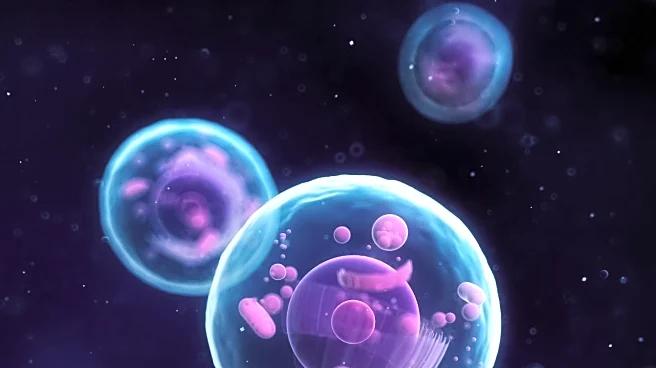What's Happening?
Researchers from the Yong Loo Lin School of Medicine at the National University of Singapore and Central South University in China have developed a modified strain of Salmonella bacteria to fight cancer. This innovative approach involves injecting genetically altered bacteria into tumors to trigger a potent immune response. The study, focusing on colorectal cancer in mice, shows promising results in reducing tumor growth. The bacteria release a protein called LIGHT, which activates the body's immune system against cancer cells. Despite the promising results in mice, the therapy's effectiveness in humans remains uncertain due to the complexity of the human immune system and gut microbiome.
Why It's Important?
The development of genetically engineered bacteria as a cancer treatment represents a significant advancement in medical research. If successful in humans, this approach could revolutionize cancer therapy by offering a more targeted treatment that minimizes damage to healthy cells. However, the use of living bacteria poses risks such as unintended infections and interactions with the patient's microbiota. The potential benefits of this therapy could provide new hope for patients with limited treatment options, but extensive research and clinical trials are necessary to ensure safety and efficacy.
What's Next?
Further research is required to determine the full potential and safety of this bacterial therapy in humans. Extensive clinical trials and rigorous testing are essential to translate the promising results from mice to human treatments. The scientific community must address the challenges of using living bacteria as therapeutic tools while exploring the potential of living drugs to reshape cancer treatment paradigms.
Beyond the Headlines
The concept of 'living drugs' using genetically engineered bacteria to combat tumors is a novel direction in cancer therapy. By leveraging bacteria's natural ability to invade hostile environments, scientists aim to create precise delivery vehicles for therapeutic agents. This method could enhance the body's immune response and lead to more sophisticated cancer treatments. The integration of mature tertiary lymphoid structures activation with bacterial therapy may further improve treatment efficacy.










